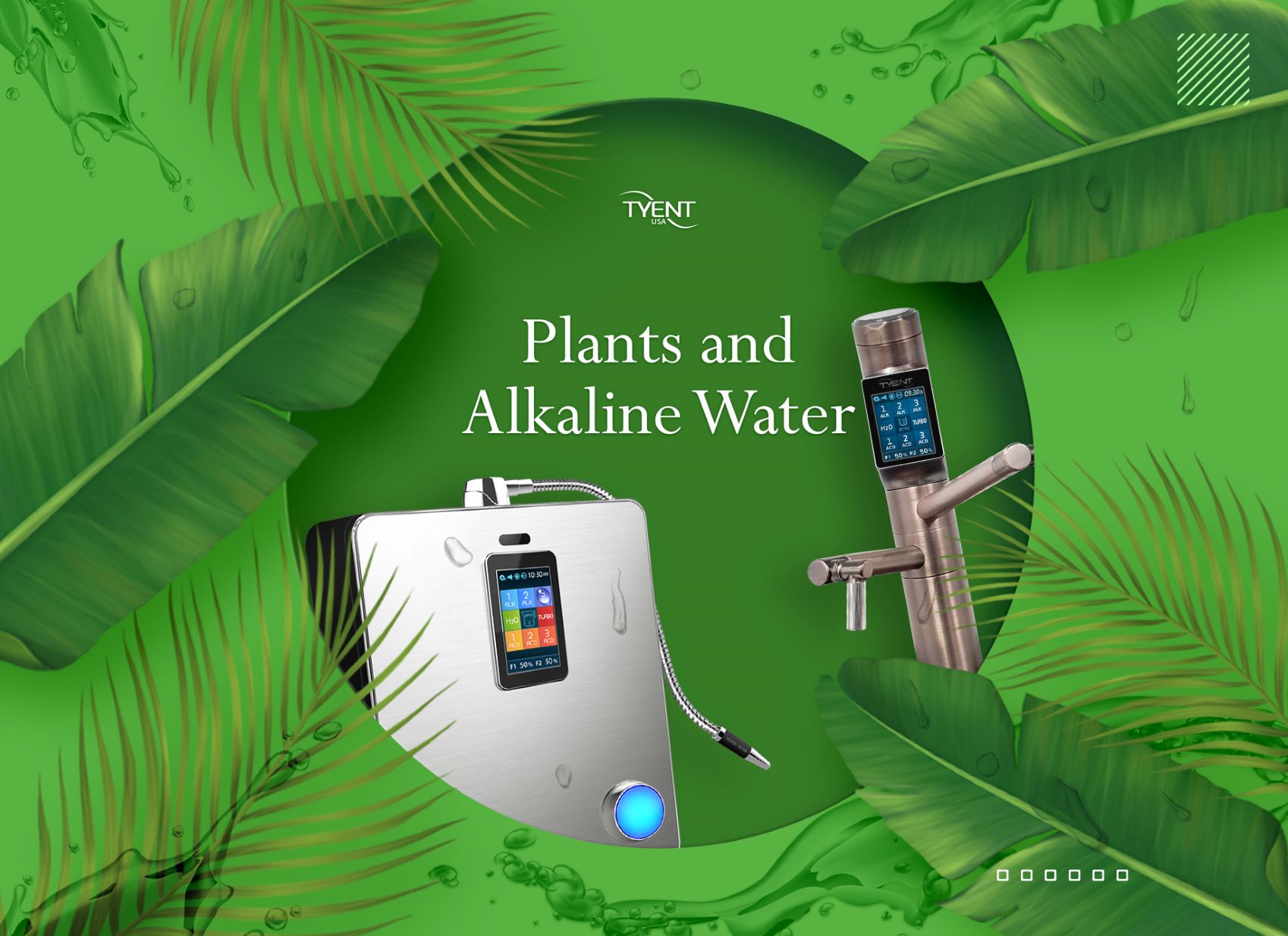Think about a basil plant in the summer. Its leaves are soft and beautifully green, just ready to tear over some ripe tomatoes in a tangle of springy, fragrant, fresh lushness. Now think about dried basil: dusty, grey-green color, sharp, crumbly texture – it’s a world away from its summer self.
The difference? Water. When you water a drooping, thirsty plant, you can almost see it start to stretch up again towards the light, vigorous life restored drop by drop.

How Water Helps Plants Grow
Okay, this isn’t news, we know. Plants need water. In fact, a good word to use here is turgor, which is the pressure created by the fluid – the water – content in every cell of a plant. Turgor is essential to the life of a plant. If you picture a healthy, hydrated plant, upright and resilient, and compare it to a flaccid, drooping, dehydrated one, you instantly understand the importance of turgidity.
But it is not just how the plant looks, turgor is vital for photosynthesis, osmosis, and transpiration. Humans require cellular turgidity too: think of your skin when it’s badly dehydrated, compared with when it is fully hydrated. Turgid cells are replete with moisture and fluid, literally swollen with water.
When you water your plants, you are giving them the very thing they need to complete the complex processes required to thrive and survive.
Where There’s Water, There’s Life
Water is life, for all living things, from single-celled cyanobacteria to the huge blue whales that swim through the ocean. Without water, nothing can live. Where there is water, there will always be life. The human body is around 60% water. Plants can be composed of anything up to 95% water. The pulp of the tree-like Saguaro Cactus, found exclusively in the Sonoran Desert can hold up to 1,500 gallons of water. Its pleated surface and collapsible cellular walls enable it to expand and hold the huge quantities of water that it relies on to produce its flowers and seeds in arid conditions.
Hydrogen Water & Plants
So now we know a bit about why plants need water so much, the big question is this: why certain types of water are so much better for your plants than regular water?
To explain, a little background is needed. According to clinical research conducted in 2014, on the effects of hydrogen on the botanical world, several interesting things were studied and observed:
- Hydrogen is involved in signal transduction pathways of plant hormones
- Hydrogen can improve plants’ resistance to drought, salinity, cold and heavy metals
- Hydrogen could delay postharvest ripening and cellular deterioration of fruits
- Hydrogen can help to regulate the flowering time of plants
- Hydrogen irrigation of crops could make fruit and vegetables taste much more delicious
These crucial markers in a plant’s life: hormonal activity, stress resistance, flowering, harvesting, ripening and taste have far-reaching implications for agriculture industries and food retailers.
“These results indicate that hydrogen may have great potential applications within agricultural production, indicating that there may be a new ‘hydrogen agricultural era’ to come.”
Zeng, J., Ye, Z. & Sun, X. Progress in the study of biological effects of hydrogen
Plants & the Food Chain
Let us also think about the status of plants in the food chain. Plants do not need to consume other living things in order to live. They produce their own sources of energy. As a result, they are at the bottom of the food chain, but vital to the life and health of virtually every other living thing.
When humans eat plants, we’re eating the nutrients – the vitamins and minerals – that the plant contains. Plants being ‘good for us’ isn’t just a vague abstract: it’s really important. That’s why there’s a gulf of difference between ‘carrots’ being listed as the twelfth ingredient in a prepacked ready meal, and eating a fresh, raw carrot. The vital nutrients we get from fresh, whole foods keep us healthy.
Ionized Alkaline Water & Plants: A Treasure Trove of Goodness
So, let’s go back to the turgidity of plants, and the essential nature of all that water surging through every cell of every plant. If that water is ionized hydrogen water, from a plant’s point of view, there is a whole treasure trove of extra goodness to be mined and used for growth and health. And if we then eat the plant, it contains more nutrients for us as well!
What about alkaline water in particular? Why is it so good for plants? Specifically, ionized alkaline water. Let’s look at tap water first. Tap water contains chlorine, concentrated amounts of which are harmful to plants. If you water your plants with tap water, it delivers dose after dose of contaminants for your plants to deal with.
Nourish Your Plants with Alkaline Water
Tyent ionized alkaline water is pure and clean. All the vital minerals are intact, and the harmful elements often found in tap water – heavy metals, chemical residues, drugs, pesticides and so on – are removed by our intelligent filters. You can water your plants with clean water that nourishes them perfectly.
Soil Alkalinity & Fluoride Toxicity
Soil alkalinity is vital to plant health. Fluoride/fluorine (fluorine refers to the elemental form, fluoride to the ionic form) can harm healthy plants. Sometimes the damage is plain to see, but it can also be the invisible reason for suppressed growth rates.
This phenomenon is known as fluoride toxicity. It interferes with several aspects of healthy plant life, including:
- Germination
- Photosynthesis
- Growth rate
- Yield (where crops are concerned)
Fluoride toxicity can also inhibit calcium’s essential role in fertilization. Another fact to bear in mind is that fluoride toxicity is accumulative and can build up in plants over a period of time. Certain plants are more susceptible than others to succumbing: spider plants, lilies, tulips, yucca and corn plants are vulnerable to fluoride toxicity, along with fruits including apricot, grapes, plums and peaches.
Signs of Fluoride Toxicity & the Alkaline Water Fix!
What are the visual signs of damage due to the presence of fluoride? A decrease in seed production, drooping flowers or fruit, flaccid leaves and brown ‘burned’ tips are the most common symptoms to look out for.
So, what’s the solution? Watering with alkaline water can help to reduce and dilute fluorine and greatly reduce the chance of fluoride toxicity.
Symbiosis: We all Need a Helping Hand
A symbiotic relationship is one that is happily interdependent. Animals and plants depend on a close relationship with each other. Symbiosis is different species relying on the presence of the other for health or survival.
Think about photosynthesis and what it means to humans – rainforests draw huge amounts of carbon dioxide from the air and breathe out the oxygen we need. Scientists believe that vast seagrass meadows under the sea do the same thing, but even more efficiently, grabbing carbon 35 times quicker than land trees and plants.
We can all contribute to this precious symbiosis in a small way. Every time we nurture a plant and care for it, water it with alkaline water and watch it grow, we’re taking care of a tiny corner of our precious symbiotic relationship.
Tyent Alkaline Water & Your Plants
Water your plants with Tyent alkaline water and your plants will thank you! No more toxic contamination from tap water. Instead, your plants can enjoy enriching, hydrating goodness from hydrogen-rich alkaline water.
We know that lots of our customers are keen gardeners and we love to hear about how alkaline water helps to grow your plots, windowsills, yards and greenhouses!
We get a lot of wonderful testimonials from our customers. One of these was a wonderful plant testimonial we received from our customer, Ron Barsotti.
In these before-and-after pictures of his bamboo plant, Ron let alkaline level 2 (pH 8.5–9.5) water soak right into the soil in order to salvage his bamboo. How amazing is that difference? From almost dead to lush, green growth. That’s the power of alkaline water for your plants!
Of course, different plants have different needs, and often have particular pH level requirements that help them thrive. Check with your local garden center if you’re unsure about the best water for your plants.
Whether you have an experienced green thumb or are just starting out with growing your own plants, Tyent alkaline water can help you get started, or carry on growing!
Water Your Plants with Alkaline Water & Show Them You Care!
Healthy, toxin-free alkaline hydration for your plants, that’s rich with natural hydrogen and minerals: it’s the water your plants would ask you for! With a Tyent water ionizer, you’re in control: you can select the precise level of alkalinity or acidity required at the push of a button.
There are countless benefits to drinking Tyent Alkaline Water for you and your family, and it’s great that your plants don’t have to miss out! Our friendly team is always on hand to answer your questions about Tyent Water Ionizers and alkaline water.









